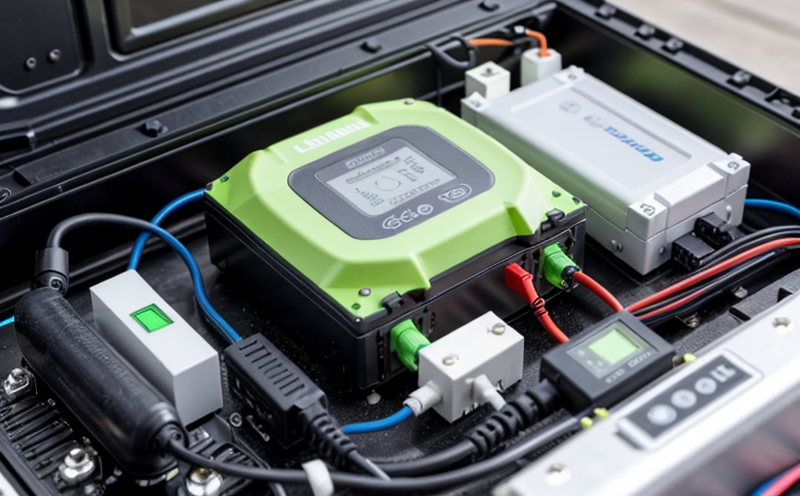BS EN 61960 Lithium-Ion Cell and Battery Testing for Portable Applications
The British Standard (BS) EN 61960 is a critical document that specifies the testing methods, acceptance criteria, and procedures for lithium-ion cells and batteries intended for portable applications. This standard ensures that products meet stringent safety requirements, which are essential in preventing accidents and ensuring consumer protection.
The standard covers a wide range of tests including electrical safety, mechanical integrity, thermal stability, and abuse testing to ensure the reliability and safety of portable electronic devices such as laptops, smartphones, and power tools. Electrical safety ensures that no dangerous levels of current or voltage are present during normal operation or when subjected to faults.
For mechanical integrity tests, specimens are subjected to various stresses like dropping from a height onto concrete surfaces, being crushed between rollers, or exposed to vibrations. Thermal stability checks the battery’s behavior under extreme heat and cold conditions. Abuse testing simulates real-world scenarios where batteries might be subjected to overcharging, short-circuiting, or exposure to fire.
The standard also provides guidance on the test environments, equipment calibration, and data analysis methods that laboratories must follow to ensure accurate results. Compliance with these stringent tests is crucial for manufacturers aiming to meet regulatory requirements in Europe and beyond.
Manufacturers of lithium-ion cells and batteries are advised to consult this standard closely during their R&D processes to ensure product safety and reliability. For quality managers, compliance officers, and R&D engineers involved in the development and production phases, thorough understanding of EN 61960 is invaluable.
| Application | Test Requirements |
|---|---|
| Laptops and notebooks | Electrical safety, mechanical integrity, thermal stability, abuse testing. |
| Smartphones and tablets | Electrical safety, mechanical integrity, thermal stability, abuse testing. |
| Power tools | Electrical safety, mechanical integrity, thermal stability, abuse testing. |
- Laptops and notebooks are essential for business professionals who require long-lasting power without heavy weight.
- Smartphones and tablets cater to consumers seeking convenience and connectivity on the go.
Applied Standards
The BS EN 61960 standard is closely aligned with other international standards such as ISO/IEC 8846, which provides additional guidance on the safety of rechargeable batteries. The European Standard (EN) 61960 ensures that lithium-ion cells and batteries for portable applications comply with all relevant regulations across Europe.
Compliance with these standards is not only a legal requirement but also a mark of trustworthiness in the global market. Manufacturers who adhere to EN 61960 demonstrate their commitment to quality, safety, and reliability, which can enhance brand reputation and consumer confidence.
The standard's rigorous testing protocols ensure that products perform consistently under various conditions, thereby increasing product longevity and reducing the risk of failures in the field. This is particularly important for manufacturers targeting the European market where stringent regulatory requirements are enforced.
Scope and Methodology
The scope of BS EN 61960 encompasses all aspects of lithium-ion cell and battery testing relevant to portable applications. This includes electrical safety, mechanical integrity, thermal stability, and abuse testing.
The methodology involves detailed procedures for each test type. For example, in electrical safety tests, the current and voltage are measured at various points during normal operation and fault conditions. Mechanical integrity is tested by subjecting samples to drop tests from varying heights onto hard surfaces like concrete or steel plates. Thermal stability testing involves exposing batteries to extreme temperatures and monitoring their behavior.
Abuse testing simulates real-world scenarios such as overcharging, short-circuiting, or exposure to fire. These tests are conducted using standardized equipment that replicates the conditions under which a battery might be used or mishandled. The data collected from these tests is analyzed to ensure compliance with all specified limits and criteria.
The standard also includes detailed guidance on the test environments required for each type of testing, as well as the calibration procedures for the equipment used. This ensures that all laboratories performing EN 61960-compliant testing are using consistent methods and achieving accurate results.
Industry Applications
- Laptops and notebooks: These devices require high-capacity batteries with long lifespan for mobility and productivity.
- Smartphones and tablets: Consumers value these portable devices for their convenience, connectivity, and multimedia capabilities.
- Power tools: Professionals in construction, manufacturing, and maintenance rely on power tools that are robust and reliable.
| Application | Test Requirements |
|---|---|
| Laptops and notebooks | Electrical safety, mechanical integrity, thermal stability, abuse testing. |
| Smartphones and tablets | Electrical safety, mechanical integrity, thermal stability, abuse testing. |
| Power tools | Electrical safety, mechanical integrity, thermal stability, abuse testing. |





